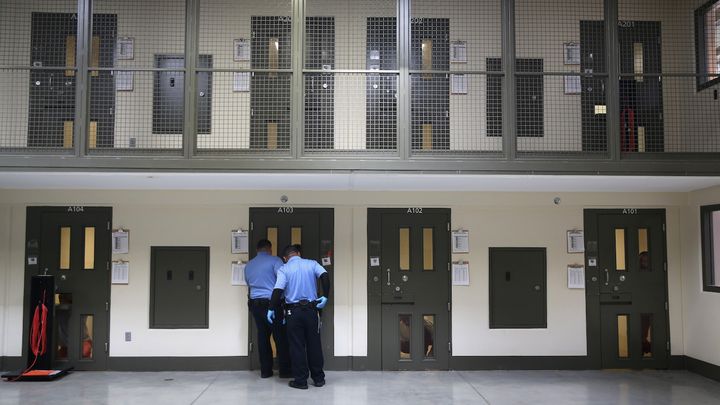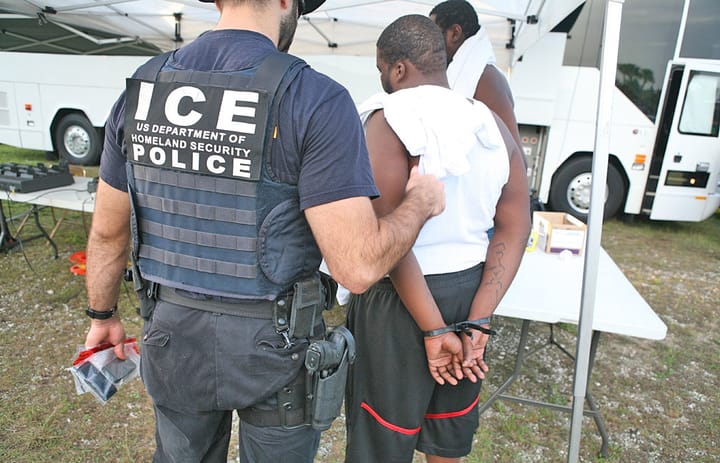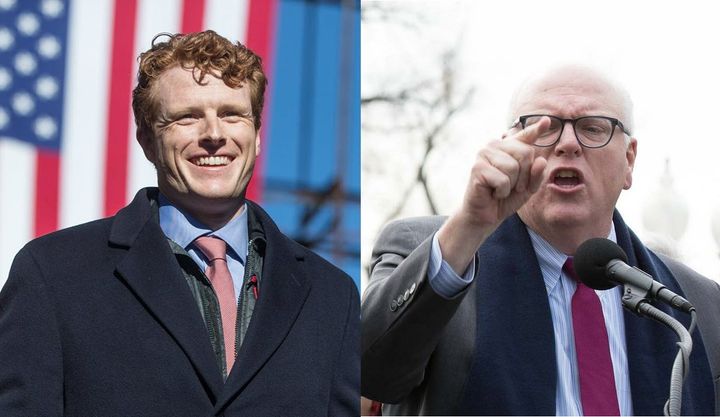This article was first published at Eyes on the Ties, a news site by LittleSis.org
In late 2019, the three largest private prison operators joined forces to establish a new group to push pro-industry talking points to the press and on social media: the Day 1 Alliance. Why is the private prison industry going on the offensive to improve its public image and secure positive earned media?
In the wake of the family separation and detention crisis of summer 2018, a broad array of organizations joined forces under the banners of #FamiliesBelongTogether and #BackersOfHate. This coalition specifically called on Wall Street banks like JPMorgan Chase and Wells Fargo to stop financing private prisons. For years, this financing has enabled the two biggest private prison companies, GEO Group and CoreCivic to expand their business, including building new facilities and securing additional lucrative government contracts.
As a result of coordinated organizing, petitions, shareholder pressure, and direct action, 2019 became a landmark year for the fight against the Wall Street banks financing private prisons. In 2019, JPMorgan Chase, Wells Fargo, Bank of America, SunTrust, BNP Paribas, Fifth Third Bancorp, Barclays, and PNC publicly announced that they would no longer provide any new financing to the private prison industry. Together, these eight banks represent an estimated $2.35 billion – or 87.4% – of the known lines of credit and term loans available to CoreCivic and GEO Group.
These announcements are enormous victories for the movement to end Wall Street’s financing of the private prison industry. Unfortunately, the growing public scrutiny on private prison companies, and the poor publicity they’ve received, has led them to turn to more aggressive measures to try and reframe the industry.
Industry Response
In their communications with investors, GEO Group and CoreCivic’s CEOs acknowledged the mounting financial, political, and social pressure they are now facing.
GEO Group’s March 2019 quarterly report acknowledged the impact of these shifts:
“Public resistance to the use of public-private partner- ships for correctional, detention and community-based facilities could result in our inability to obtain new contracts or the loss of existing contracts, impact our ability to obtain or refinance debt financing or enter into commercial arrangements, which could have a material adverse effect on our business, financial condition and results of operations.”
In their August 2019 Q2 investor call, CoreCivic’s CEO Damon Hininger criticized decisions to no longer finance his company:
“Despite many of the banks claims of conducting a thorough review process, they clearly bow down to a small group of activists protesting and conducting targeted social media campaigns pushing false information rather than engage in a constructive dialogue about the facts….”
In their recent 2019 Q4 investor call, CoreCivic indicated that it is still feeling the effects of the 2019 surge in banks ending their future financing relationships with the industry:
“As the market prices for our securities have been affected primarily by headlines from some of the industry’s banking partners as well as Washington politics, we have tempered our M&A pursuits and have no other M&A transactions in our guidance.”
Now these companies are going on the offensive with a new industry advocacy organization.
What is the Day 1 Alliance?
The Day 1 Alliance (D1A) was announced in a press release distributed through the Associated Press wire service on October 25th, 2019. The founding members of the group are the top three private prison operators: GEO Group, CoreCivic, and Management and Training Corporation (MTC). D1A was clearly formed to rebut criticism of the private prison industry, but apart from the information contained in its press release, little has been reported about it and how it plans to operate. In November, CoreCivic CEO Damon Hininger described the group to shareholders in general terms as a “trade association representing private sector contractors.”
According to its press release, the group plans to educate “Americans on the small but valued role the private sector plays in addressing corrections and detention challenges in the United States.” In November, just a month after announcing its formation, D1A sent a letter to Attorney General William Barr to address “misinformation on [their] role in corrections.” While the letter was sent officially by the Day 1 Alliance, it was signed by three key executives from the private prisons: Celeste McDonald, Vice President of Corporate Communications at MTC; Steve Owen, Managing Director of Communications at CoreCivic; and Pablo E. Paez, Executive Vice President of Corporate Relations at GEO Group.
If you navigate to the D1A website you will find a rundown of industry talking points, including that private operators are less costly to taxpayers, reduce recidivism, provide high quality inmate security, and offer higher quality services on the whole. These familiar talking points are trotted out whenever the industry model is called into question. Notably, the D1A website page that makes these assertions does not include any links to studies or other research that backs up their claims.
However, one key assertion stands out among these standard talking points: “Keeping Families Together.” Here D1A is echoing a point frequently asserted by the private prison companies to try and distance themselves from criticism about the Trump administration’s family separation policies: that they don’t run youth detention centers, only family detention centers.

D1A admits that its partner organizations have prisons for detained adult immigrants, and GEO Group and CoreCivic have facilities that specifically house mothers and children together. However, D1A does not address the fact that some of the adults in their prisons may have children detained elsewhere or that families may have more than a single parent, implicating them in family separation.
While D1A bills itself as an advocacy organization, it may be too early to predict whether they plan to formally lobby Congress on behalf of the private prison industry. However, filings compiled by the Center for Responsive Politics show that the three corporate founders, CoreCivic, GEO Group, and MTC, spent a combined $3.97 million on lobbying in 2019.
Who is Running the Day 1 Alliance?
The Day 1 Alliance is led by Alexandra Wilkes, who was previously the Executive Director of the America Rising Super PAC. In 2014, the Republican National Committee named Wilkes a “Rising Star,” and she was previously National Chairman of the College Republican National Committee. America Rising is a conservative for-profit opposition research firm launched in 2013 after Barack Obama defeated Mitt Romney in the 2012 election. As the Wall Street Journal reported, America Rising is “the unofficial research arm of the Republican Party.” In 2016, America Rising reportedly “launched a for-profit venture aimed at helping companies, trade associations and wealthy individuals push back against detractors and navigate sensitive shareholder or public-policy fights.”
The group is notorious for using cameras, microphones, and other tactics to undermine its opponents. As of 2018, among the PACs 100 staff, 25 were full time candidate trackers, who serve as “political detectives […] scouring archives, public records, real-time video and decades of old footage.” These operatives follow candidates around the country and record public speeches in order to document any potential gaffes or missteps. The group has been accused of using questionable tactics, including launching a social media campaign to reduce voter turnout among Hilary Clinton voters in the 2016 election. According to Truthout “During Wilkes’ tenure, America Rising branched out from focusing on elected officials and candidates and turned its attention to career employees at the Environmental Protection Agency (EPA) who criticized President Donald Trump and/or EPA Administrator Scott Pruitt—an effort that has been called a “witch hunt.””
Given Wilkes’ previous role at America Rising, it is not surprising she was tapped by the private prison industry to repair its tarnished reputation and increasingly negative public image. At the time of D1A’s launch, Wilkes stated, without supporting evidence, that “private contractors lead through innovative programs that reduce recidivism, help prevent humanitarian crises stemming from immigration flows at the border, and provide flexible, cost-effective solutions to government partners in order to achieve vital public safety needs.”
Wilkes has already gone on the offensive, penning a January 2020 story after she reportedly spent a week at a family ICE detention facility in Texas. According to Wilkes, “Children weren’t in cages. They were in classrooms and on playgrounds.” She went on to claim “nobody was drinking out of toilets, but there is an all-you-can-eat salad bar.” D1A’s Newsroom compiles a series of pro-private prison op-eds which have been published in high profile outlets like the Washington Post, the Economist, and the San Francisco Chronicle. Since D1A’s launch, Wilkes has also published several opinion pieces in Morning Consult and TownHall.
Research Refutes Industry Talking Points
There is plenty of research that undermines the talking points pushed out by this industry. Comparing D1A public claims with research on conditions in private prisons, highlights the extent to which the private prison industry paints a false picture of the effectiveness of their services. In 2016 the U.S. Department of Justice released a report that found that private prisons had higher rates of security incidents, higher rates of assaults, and inappropriately housed inmates in solitary confinement against federal policy. Following the DOJ report, Deputy Attorney General Sally Yates wrote that private prisons “do not provide the same level of correctional services, programs, and resources; they do not save substantially on costs;… and do not maintain the same level of safety and security.”
An independent 2016 study fromIn The Public Interest further showed that people incarcerated in private prisons have higher rates of recidivism than people incarcerated in public prisons due to a number of factors, including exposure to higher rates of violence and being housed at facilities far from their communities in order to fill empty beds at for-profit facilities. Moreover, conditions at private prisons in the United States have been the subject of international condemnation. In 2017 attorneys with the ACLU testified before the United Nations about the inhumane conditions in for-profit facilities in the United States.
What will the Day 1 Alliance Accomplish?
The private prison industry formed the Day 1 Alliance against the backdrop of falling stock prices, banks are ending their financing relationships, lowered credit ratings, and prominent pension funds divesting from the industry entirely. Moreover the 2020 Democratic Presidential candidates have made the elimination of private prisons a key campaign talking point with front runners Sanders, Biden, and Warren all vowing to end the government’s contracts with the industry.
Ultimately, the Day 1 Alliance may just be the industry’s latest attempt to preserve its toxic business model. However, it is clear that people already see these corporations and their business practices for what they are.
Related:



